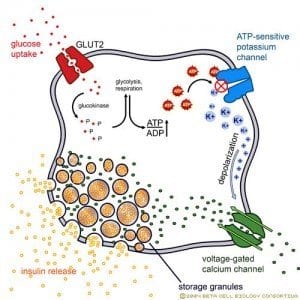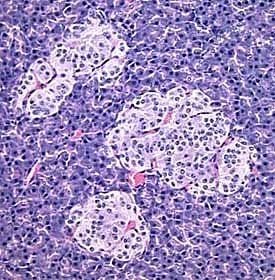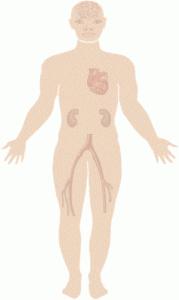 A new study published in Annals on Oncology, a cancer-focused research journal, has found that trastuzumab (Herceptin) — a breast cancer drug — increases the risk of heart complications. Women who have diabetes and women with a history of heart disease are especially at risk.
A new study published in Annals on Oncology, a cancer-focused research journal, has found that trastuzumab (Herceptin) — a breast cancer drug — increases the risk of heart complications. Women who have diabetes and women with a history of heart disease are especially at risk.
The study analyzed the medical data of 45 women between the ages of 70 and 92 who had been treated with trastuzumab starting in 2005. Researchers found that 26.7% of the patients demonstrated heart problems that were caused by the drug. This rate was slightly higher than the rate demonstrated in younger and healthier women during the drug’s clinical testing phase. Trastuzumab caused 33% of the women with histories of heart disease to develop asymptomatic or symptomatic heart problems while only 9.1% of women without a history of heart disease developed those problems. Similarly, 33.1% of women with diabetes experienced new heart problems compared to only 6.1% of non-diabetic women. All but one of the women recovered fully once treatment with the drug was discontinued; five of the women renewed their treatment with the drug upon the disappearance of the problems.
Trastuzumab is currently the most-used medication for treating women with HER2 positive breast cancer, or the type of cancer that causes expression of the HER2 protein on the surface of the cancer cells. Elderly women are most at risk for breast cancer but trastuzumab has also been tested on younger, healthy women in clinical trials.
The study was conducted by Dr. César Serrano, a clinical fellow in Barcelona, Spain at the University Hospital Department of Medical Oncology Breast Cancer Centre. “This is the first study to specifically assess trastuzumab-related cardiac toxicity and the cardiovascular factors that are associated with an increased risk in a selected population of elderly breast cancer patients,” said Serrano of the study.
“Trastuzumab is generally well-tolerated and, although there are some concerns about it causing heart problems, until now few risk factors have been identified among patients in clinical trials, most of whom are usually younger than 70 years and have good general health,” continued Serrano. “Our study has demonstrated a significantly increased incidence of cardiac events among patients aged 70 and over with cardiovascular risk factors such as a history of cardiac disease and diabetes.
“Approximately 70% of all newly diagnosed cancers occur in patients older than 65 and, given the expected increase in the absolute number of elderly cancer patients over the coming decades in Western countries, there is an unmet need for information about the efficacy and safety of anti-cancer treatments in daily clinical practice. Data obtained in this report can serve to advise clinicians to be aware of symptomatic and asymptomatic cardiac dysfunction in elderly patients. We think that it is reasonable to refer elderly breast cancer patients to a cardiologist if one or more cardiovascular risk factors are present before or during treatment with trastuzumab. Moreover, a closer surveillance of early symptoms and cardiac function is highly recommended.”
Patients developed both asymptomatic and symptomatic cardiotoxicity after administration of trastumuzab. Asymptomatic cardiotoxicity occurs when no obvious symptoms of heart problems are apparent but scanning or echocardiography reveals that the heart’s left ventrible drops in function by 10% or more. Symptomatic cardiotoxicity shows apparent physical symptoms such as swelling of the limbs and shortness of breath; this type of cardiotoxicity includes congestive heart failure.
“One of the main characteristics of trastuzumab cardiotoxicity is its reversibility,” said Serrano. “It is a well-known phenomenon that differs from other chemotherapeutic agents such as anthracyclines. Reversibility normally happens with treatment discontinuation, but also can also occur spontaneously. The decision to reintroduce trastuzumab, or to continue with it, must be taken case-by-case together with a cardiologist.”
 A research team at Vienna General Hospital’s University Department of Internal Medicine III has found that preemptive
A research team at Vienna General Hospital’s University Department of Internal Medicine III has found that preemptive  Physicist Aaron Keller and his colleagues at the Helmholtz-Zentrum Dresden-Rossendorf in Germany and at Aarhus University in Denmark have reported a significant advancement in the possibility of treatment for Type 2 diabetes and Alzheimer’s disease. The researchers are studying amyloids, or clumps of
Physicist Aaron Keller and his colleagues at the Helmholtz-Zentrum Dresden-Rossendorf in Germany and at Aarhus University in Denmark have reported a significant advancement in the possibility of treatment for Type 2 diabetes and Alzheimer’s disease. The researchers are studying amyloids, or clumps of  Tampa Bay Rays outfielder Sam Fuld made the day of one six-year-old boy when he visited Andrew Cordovez in an examination room. Fuld had one special connection with the young boy: they both have Type 1 diabetes.
Tampa Bay Rays outfielder Sam Fuld made the day of one six-year-old boy when he visited Andrew Cordovez in an examination room. Fuld had one special connection with the young boy: they both have Type 1 diabetes. Mannkind (MKND) stock rose more than 20%, showing increased investor confidence after the fledgling pharmaceutical company confirmed that it has received approval from the FDA for clinical trials on its key product. Mannkind received FDA clearance to conduct efficacy trials on a new inhaled
Mannkind (MKND) stock rose more than 20%, showing increased investor confidence after the fledgling pharmaceutical company confirmed that it has received approval from the FDA for clinical trials on its key product. Mannkind received FDA clearance to conduct efficacy trials on a new inhaled  Researchers at York University have discovered a new
Researchers at York University have discovered a new  Patients suffering with Type 2 diabetes are commonly prescribed a combination of
Patients suffering with Type 2 diabetes are commonly prescribed a combination of  Fat Levels Higher in Thin Children” width=”290″ height=”249″ />A study conducted by Children’s Hospital Boston and the Joslin Diabetes Center has revealed that levels of “brown fat,” a healthy type of fat that appears in children, increase in puberty and then decrease after. The study also showed that thinner children have higher levels of brown fat. The study was published in the Journal of Pediatrics.
Fat Levels Higher in Thin Children” width=”290″ height=”249″ />A study conducted by Children’s Hospital Boston and the Joslin Diabetes Center has revealed that levels of “brown fat,” a healthy type of fat that appears in children, increase in puberty and then decrease after. The study also showed that thinner children have higher levels of brown fat. The study was published in the Journal of Pediatrics. The Journal of Sexual Medicine recently published a new study demonstrating that weight loss in men with Type 2 diabetes is more than just a healthy choice. It also improves sexual health, increasing erectile function and desire while lowering the risk of developing urinary tract symptoms.
The Journal of Sexual Medicine recently published a new study demonstrating that weight loss in men with Type 2 diabetes is more than just a healthy choice. It also improves sexual health, increasing erectile function and desire while lowering the risk of developing urinary tract symptoms. The smell of that hamburger or steak (unprocessed meat) on the backyard grill is tantalizing, but we all know that we’re not supposed to have too much of it simply because it’s not great for our health for a number of reasons, to include the susceptibility to type 2 diabetes. But, it’s now known that that hotdog (processed meat) lying beside that hamburger on the grill might be a little bit worse for your health than the burger or steak, including your susceptibility to type 2 diabetes.
The smell of that hamburger or steak (unprocessed meat) on the backyard grill is tantalizing, but we all know that we’re not supposed to have too much of it simply because it’s not great for our health for a number of reasons, to include the susceptibility to type 2 diabetes. But, it’s now known that that hotdog (processed meat) lying beside that hamburger on the grill might be a little bit worse for your health than the burger or steak, including your susceptibility to type 2 diabetes.